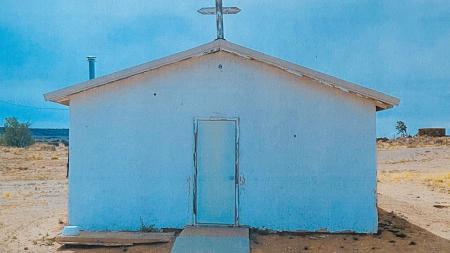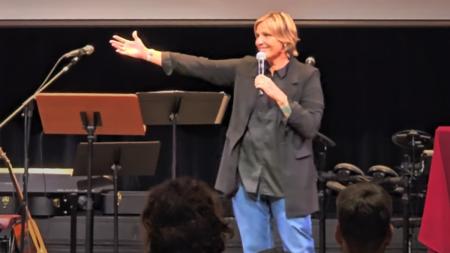Seminary Professor Speaks in Heidelberg on Heidelberg

Rev. Lyle Bierma has traveled to several international conferences over the last eight months, speaking to groups about the Heidelberg Catechism, the historic statement of faith that this year celebrates its 450th anniversary.
One of his stops was in Heidelberg, where the catechism was written at the request of the area’s ruler who wanted a document to which Reformed Christians could adhere.
As part of the 450th celebration, all Christian Reformed Church congregations are being asked this Sunday to recite Q&A 1 of the catechism— perhaps the most well-known of the questions in the document. It asks: “What is your only comfort in life and death?”
Bierma, a professor of systematic theology at Calvin Theological Seminary, says the various audiences to whom he spoke responded with great interest to the themes presented in the conferences.
“As one might expect, the scholarly conferences tended to treat the HC more as a topic of historical and cultural interest than as a document that still lives and breathes in the church today,” he says.
“At the more popular conferences, I was struck by the great appreciation people still have for the HC 450 years after its birth but also by their willingness to wrestle with questions about how well the HC can serve confessional Reformed churches in the 21st century.”
Published in German and Latin in 1563, the Heidelberg was written as a tool for teaching young people the precepts of the church, to serve as a guide for preaching and as a source of unity for a range of Protestant churches.
The Heidelberg is one of the CRC’s foundational confessions, long admired for its clarity “as an expression of the Reformed Christian faith as well as for its warmth and personal tone,” says Rev. Leonard Vander Zee, who was editor of a special anniversary edition of the catechism for Faith Alive Christian Resources.
In January, Bierma spoke at the Third Annual Canadian Reformed Theological Seminary Lecture Series: “Your Only Comfort: Celebrating 450 Years with the HC” at the Canadian Reformed Theological Seminary, Hamilton, Ontario.
“My presentation was on ‘The Doctrine of the Covenant in the Heidelberg Catechism.’ The conference was open to the public, and about 400 ministers and laypeople attended.”
Then he spoke at conferences in Europe, the first being in Leuven, Belgium. There he spoke on the theme “The Heidelberg Catechism in Ecumenical Perspective.
The conference was sponsored by the Evangelische Theologische Faculteit in collaboration with the Center for Ecumenical Research of the Catholic University of Leuven and the Faculteit voor Protestantse Godgeleerdheid of Brussels.
“This was a scholarly conference, attended by about 60 professors and seminary students.”
In May, he spoke on the theme “Profile and Impact of the HC," in Heidelberg, Germany, organized by the Faculty of Theology of the University of Heidelberg in cooperation with the Society for Reformation History.
This was a high-powered, scholarly conference, drawing an international slate of scholars and attended by 60 people.
“It was held in conjunction with the official opening of two special exhibitions on the HC at the castle and the Palatinate Museum in Heidelberg. My paper was on ‘The Theological Origins of the HC’."
The Palatinate was the German province where the city of Heidelberg was located.
Bierma spoke in June on the theme “The Spirituality of the Heidelberg Catechism” at the Theological University of Apeldoorn in collaboration with the Theologische Universiteit Kampen and the Hersteld Hervormd Seminarie at the Vrije Universiteit Amsterdam.
“This conference was open to the public but was attended mostly by professors, ministers, and theology students. I gave a paper on "Zacharias Ursinus and the Theological Landscape of the HC."
In July, he spoke at the 4th annual Heidelberg Conference on Reformed Theology, hosted by the Free Evangelical-Reformed Church of Heidelberg at the Molkenkur Hotel and Conference Center in Heidelberg on the history and theology of the HC.
This was a more popular conference, he says, and was attended by about 100 laypeople, military chaplains, members of a Reformation Heritage tour (all from the US and Canada), and seminary students. “I spoke on the historical background of the HC,” he says.


